E.M.Forster
E.M.Forster作家福斯特简介

Forster was educated as a dayboy at the Tonbridge School, causing his later criticism of the English Public School system.
Then, Forster attended King’s College, Cambridge, enjoying a sense of liberation. After leaving Cambridge, Forster became a writer .
During the WWⅠ, E. M. Forster spent 3 years in Alexandria doing civilian work and visited India twice. A Passage to India
In 1946, his old college gave him an honorary fellowship, enabling him to make his home in Cambridge. He lived there until his death in 1970.
LOGO
E. M. Forster
E. M. Forster
A noted English novelist, social and literary critic, and essayist.
E. M. Forster
Ⅰ
Forster’s Life
Ⅱ
Major works
Foster was born in London in 1897. Father died of consumption. He was raised by mother and paternal aunt.
E. M. Forster
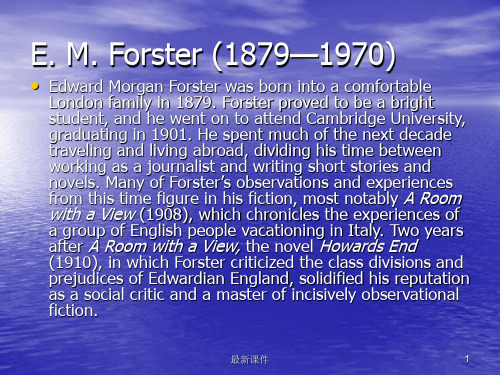
immediately acclaimed as Forster’s masterpiece upon its publication. It is a traditional social and political novel, unconcerned with the technical innovation of some of Forster’s modernist contemporaries such 最a新s课G件ertrude Stein or T.S. 4
Aspects of the Novel (1927). In 1946, Forster
accepted a fellowship at Cambridge, where he remained until his death in 1970.
最新课件
5
The Road from Colonus
just after his first visit to India. Published in
1924, A Passage to India examines the racial
misunderstandings and cultural hypocrisies that characterized the complex interactions between Indians and the English toward the end of the British occupation of India. Forster’s style is marked by his sympathy for his characters, his ability to see more than one side of an argument or story, and his fondness for simple, symbolic tales that neatly encapsulate large-scale problems and conditions. These tendencies are
20世纪英国文学作者及作品

To the Lighthouse
wrence
戴维· 赫伯特· 劳伦斯(David Herbert lawrence,18851930),英国文学家,诗人。 为二十世纪英国最独特和最有 争议的作家之一,他笔下有许 多脍炙人口的名篇,其中的 《查泰莱夫人的情人》 (1928),《儿子与情人》, 《虹》(1915),《恋爱中 的女人》(1921),《误入 歧途的女人》等都有中译本。
•Modernism •Postmodernism
Modernism
Joseph Conrad
Virginia Woolf
wrence
E.M.Forster
Joseph Conrad
1857年12月3日生于波兰,在上流社会 的家庭中度过了童年生活。后来,他逃 到了马赛,在那里他曾先后在许多只船 上做工。在一艘英国船上当水手时,他 只懂6个英语单词。2O年后,他成为世 界著名的用英文写作的作家。《吉姆爷》 (1900年)和《神秘参与者》(1912 年)体现了典型的康拉德笔下的人物。 他们是在一个多少有些疯狂的世界上, 进行着单枪匹马斗争的人们。他精通英 语,擅长航海。他把他全部的爱都倾注 在描写海员的书中,描写在神秘的刚果 河上航行的《黑暗的中心》(19O2年) 是他最负盛誉的小说。1924年8月3日, 约瑟夫· 康拉德去世,终年67岁。
Virginia Woolf
弗吉尼亚· 伍尔夫,英国女作家。 1882年1月25日生于伦敦的文学世 家。在小说创作和文学评论两方面 都有卓越的贡献。世界三大意识流 作家之一,女权主义运动的先驱人 物。深受弗洛伊德心理学、女性主 义及同性恋运动影响。她在文学上 的成就和创造性至今仍然产生很大 的影响。 , 第二次世界大战波及英国后,她情 绪不安,住所也遭到轰炸。1941 年3月28日在离家不远的乌斯河投 水自尽。
E.M Froser 简介
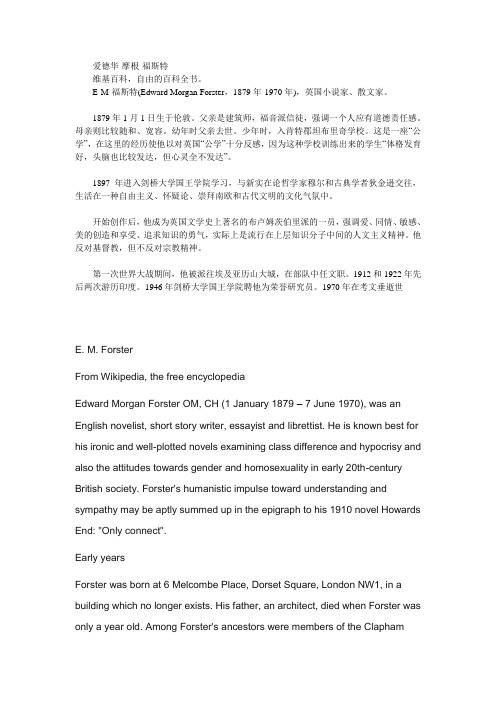
爱德华·摩根·福斯特维基百科,自由的百科全书。
E·M·福斯特(Edward Morgan Forster,1879年-1970年),英国小说家、散文家。
1879年1月1日生于伦敦。
父亲是建筑师,福音派信徒,强调一个人应有道德责任感。
母亲则比较随和、宽容。
幼年时父亲去世。
少年时,入肯特郡坦布里奇学校。
这是一座“公学”,在这里的经历使他以对英国“公学”十分反感,因为这种学校训练出来的学生“体格发育好,头脑也比较发达,但心灵全不发达”。
1897年进入剑桥大学国王学院学习,与新实在论哲学家穆尔和古典学者狄金逊交往,生活在一种自由主义、怀疑论、崇拜南欧和古代文明的文化气氛中。
开始创作后,他成为英国文学史上著名的布卢姆茨伯里派的一员,强调爱、同情、敏感、美的创造和享受、追求知识的勇气,实际上是流行在上层知识分子中间的人文主义精神。
他反对基督教,但不反对宗教精神。
第一次世界大战期间,他被派往埃及亚历山大城,在部队中任文职。
1912和1922年先后两次游历印度。
1946年剑桥大学国王学院聘他为荣誉研究员。
1970年在考文垂逝世E. M. ForsterFrom Wikipedia, the free encyclopediaEdward Morgan Forster OM, CH (1 January 1879 – 7 June 1970), was an English novelist, short story writer, essayist and librettist. He is known best for his ironic and well-plotted novels examining class difference and hypocrisy and also the attitudes towards gender and homosexuality in early 20th-century British society. Forster's humanistic impulse toward understanding and sympathy may be aptly summed up in the epigraph to his 1910 novel Howards End: "Only connect".Early yearsForster was born at 6 Melcombe Place, Dorset Square, London NW1, in a building which no longer exists. His father, an architect, died when Forster was only a year old. Among Forster's ancestors were members of the ClaphamSect. As a boy he inherited £8,000 from his paternal great-aunt Marianne Thornton, daughter of the abolitionist Henry Thornton, which was enough to live on and enabled him to become a writer. He attended Tonbridge School in Kent as a day boy. The theatre at the school is named after him.At King's College, Cambridge, between 1897 and 1901,[1] he became a member of the Apostles (formally named the Cambridge Conversazione Society), a discussion society. Many of its members went on to constitute what came to be known as the Bloomsbury Group, of which Forster was a peripheral member in the 1910s and 1920s. There is a famous recreation of Forster's Cambridge at the beginning of The Longest Journey.After leaving university he travelled on the continent with his mother. He visited Egypt, Germany and India with the classicist Goldsworthy Lowes Dickinson in 1914. When the First World War broke out, he became a conscientious objector.Forster spent a second spell in India in the early 1920s as the private secretary to the Maharajah of Dewas. The Hill of Devi is his non-fictional account of this trip. After returning from India, he completed his last novel, A Passage to India (1924), for which he won the James Tait Black Memorial Prize for fiction. After A Passage to IndiaArlington Park Mansions, ChiswickIn the 1930s and 1940s Forster became a successful broadcaster on BBC Radio and a public figure associated with the British Humanist Association. He was awarded a Benson Medal in 1937.Forster developed a friendship with Bob Buckingham, a policeman, and his wife, May, and included the couple in his circle, which also included the writer and editor of The Listener, J.R. Ackerley, the psychologist W.J.H. Sprott, and, for a time, the composer Benjamin Britten. Other writers with whom Forster associated included the poet Siegfried Sassoon and the Belfast-based novelist Forrest Reid.From 1925 until her death in March 1945 the novelist lived with his mother Alice Clare (Lily) in West Hackhurst, Abinger Hammer, finally leaving on or around 23 September 1946.[2] His London base was 26, Brunswick Square from 1930 to 1939, after which he rented 9, Arlington Park Mansions in Chiswick until at least 1961.[3][4]Forster was elected an honorary fellow of King's College, Cambridge in January 1946,[3] and lived for the most part in the college, doing relatively little. He declined a knighthood in 1949 and was made a Companion of Honour in 1953.[3] In 1969 he was made a member of the Order of Merit. Forster died in Coventry on 7 June 1970 at the age of 91, at the home of the Buckinghams.[3] NovelsForster had five novels published in his lifetime. Although Maurice appeared shortly after his death, it had been written nearly sixty years earlier. A seventh novel, Arctic Summer, was never finished.His first novel, Where Angels Fear to Tread (1905), is the story of Lilia, a young English widow who falls in love with an Italian man, and of the efforts of her bourgeois relatives to get her back from Monteriano (based on San Gimignano). The mission of Philip Herriton to retrieve her from Italy has features in common with that of Lambert Strether in Henry James's The Ambassadors, a work Forster discussed ironically and somewhatdisapprovingly in his book Aspects of the Novel (1927). Where Angels Fear to Tread was adapted into a film by Charles Sturridge in 1991.Next, Forster published The Longest Journey (1907), an inverted bildungsroman following the lame Rickie Elliott from Cambridge to a career as a struggling writer and then to a post as a schoolmaster, married to the unappetising Agnes Pembroke. In a series of scenes on the hills of Wiltshire which introduce Rickie's wild half-brother Stephen Wonham, Forster attempts a kind of sublime related to those of Thomas Hardy and D. H. Lawrence. Forster's third novel, A Room with a View (1908), is his lightest and most optimistic. It was started before any of his others, as early as 1901, and exists in earlier forms referred to as "Lucy". The book is the story of young Lucy Honeychurch's trip to Italy with her cousin, and the choice she must make between the free-thinking George Emerson and the repressed aesthete Cecil Vyse. George's father Mr Emerson quotes thinkers who influenced Forster, including Samuel Butler. A Room with a View was filmed by Merchant-Ivory in 1985.Where Angels Fear to Tread and A Room with a View can be seen collectively as Forster's Italian novels. Both include references to the famous Baedeker guidebooks and concern narrow-minded middle-class English tourists abroad. The books share many themes with short stories collected in The Celestial Omnibus and The Eternal Moment.Howards End (1910) is an ambitious "condition-of-England" novel concerned with different groups within the Edwardian middle classes represented by the Schlegels (bohemian intellectuals), the Wilcoxes (thoughtless plutocrats) and the Basts (struggling lower-middle-class aspirants).It is frequently observed that characters in Forster's novels die suddenly. This is true of Where Angels Fear to Tread, Howards End and, most particularly, The Longest Journey.Forster achieved his greatest success with A Passage to India (1924). The novel takes as its subject the relationship between East and West, seen through the lens of India in the later days of the British Raj. Forster connects personal relationships with the politics of colonialism through the story of the Englishwoman Adela Quested, the Indian Dr. Aziz, and the question of what did or did not happen between them in the Marabar Caves.Maurice (1971) was published posthumously. It is a homosexual love story which also returns to matters familiar from Forster's first three novels, such as the suburbs of London in the English home counties, the experience of attending Cambridge, and the wild landscape of Wiltshire. The novel was controversial, given that Forster's sexuality had not been previously known or widely acknowledged. Today's critics continue to argue over the extent to which Forster's sexuality, even his personal activities,[5] influenced his writing. Key themesForster's views as a humanist are at the heart of his work, which often depicts the pursuit of personal connections in spite of the restrictions of contemporary society. His humanist attitude is expressed in the non-fictional essay What I Believe.Forster's two best-known works, A Passage to India and Howards End, explore the irreconcilability of class differences. A Room with a View also shows how questions of propriety and class can make connection difficult. The novel is his most widely read and accessible work, remaining popular longafter its original publication. His posthumous novel Maurice explores the possibility of class reconciliation as one facet of a homosexual relationship. Sexuality is another key theme in Forster's works, and it has been argued that a general shift from heterosexual love to homosexual love can be detected over the course of his writing career. The foreword to Maurice describes his struggle with his own homosexuality, while similar issues are explored in several volumes of homosexually charged short stories. Forster's explicitly homosexual writings, the novel Maurice and the short-story collection The Life to Come, were published shortly after his death.Forster is noted for his use of symbolism as a technique in his novels, and he has been criticised (as by his friend Roger Fry) for his attachment to mysticism. One example of his symbolism is the wych elm tree in Howards End; the characters of Mrs Wilcox in that novel and Mrs Moore in A Passage to India have a mystical link with the past and a striking ability to connect with people from beyond their own circles.Notable works by ForsterNovels•Where Angels Fear to Tread (1905)•The Longest Journey (1907)• A Room with a View (1908)•Howards End (1910)• A Passage to India (1924)•Maurice (written in 1913–14, published posthumously in 1971)•Arctic Summer (an incomplete fragment, written in 1912–13, published posthumously in 2003)Short stories•The Celestial Omnibus (and other stories) (1911)•The Eternal Moment and other stories (1928)•Collected Short Stories (1947) a combination of the above two titles, containing:o "The Story of a Panic"o "The Other Side Of The Hedge"o "The Celestial Omnibus"o "Other Kingdom"o "The Curate's Friend"o "The Road from Colonus"o "The Machine Stops"o "The Point of It"o "Mr Andrews"o "Co-ordination"o "The Story of the Siren"o "The Eternal Moment"•The Life to Come and other stories (1972) (posthumous) containing the following stories written between approximately 1903 and 1960:o "Ansell"o "Albergo Empedocle"o "The Purple Envelope"o "The Helping Hand"o "The Rock"o "The Life to Come"o "Dr Woolacott"o "Arthur Snatchfold"o "The Obelisk"o "What Does It Matter? A Morality"o "The Classical Annex"o "The Torque"o "The Other Boat"o "Three Courses and a Dessert: Being a New and Gastronomic Version of the Old Game of Consequences"o "My Wood"Plays and pageants•Abinger Pageant (1934)•England's Pleasant Land (1940)Film scripts• A Diary for Timothy (1945) (directed by Humphrey Jennings, spoken by Michael Redgrave)Libretto•Billy Budd (1951) (based on Melville's novel, for the opera by Britten) Collections of essays and broadcasts•Abinger Harvest (1936)•Two Cheers for Democracy (1951)Literary criticism•Aspects of the Novel (1927)•The Feminine Note in Literature (posthumous) (2001)Biography•Goldsworthy Lowes Dickinson (1934)•Marianne Thornton, A Domestic Biography (1956)Travel writing•Alexandria: A History and Guide (1922)•Pharos and Pharillon (A Novelist's Sketchbook of Alexandria Through the Ages) (1923)•The Hill of Devi (1953)Miscellaneous writings•Selected Letters (1983–85)•Commonplace Book (1985)•Locked Diary (2007) (held at King's College, Cambridge)Notable films based upon novels by Forster• A Passage to India (1984), dir. David Lean• A Room with a View (1985), dir. James Ivory•Maurice (1987), dir. James Ivory•Where Angels Fear to Tread (1991), dir. Charles Sturridge •Howards End (1992), dir. James Ivory。
E.M.Forster
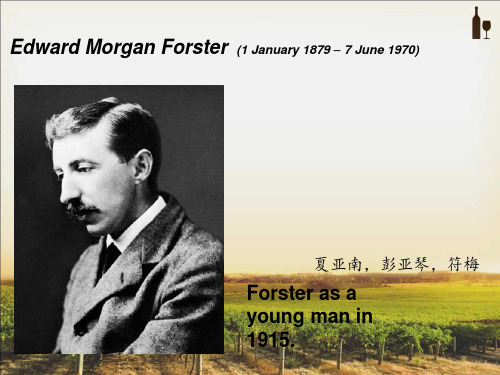
short story writer
essayist and librettist (歌词作者;剧本作者).
Forster’s fiction, conservative in form, is in the English tradition of the novel of manners. He explores the emotional and sensual deficiencies of the English middle class, developing his themes by means of irony, wit, and symbolism.
• 《最漫长的旅程》
A Room with a View
• A Room with a View (1908),is his lightest and most optimistic.The book is the story of young Lucy Honeychurch's trip to Italy with her cousin, and the choice she must make between the free-thinking George Emerson and the repressed aesthete Cecil Vyse.A Room with a View was filmed by • Merchant-Ivory in 1985. • 《看得见风景的房间》/《窗外有蓝天》
Maurice《莫利斯》
• • • • • • • Maurice (1971) was published posthumously. It is a homosexual love story which also returns to matters familiar from Forster's first three novels. The novel was controversial, given that Forster's homosexuality had not been previously known or widely acknowledged. • Today's critics continue to argue over the extent to which Forster's sexuality, even his personal activities, influenced his writing.
E.M.Forster简介
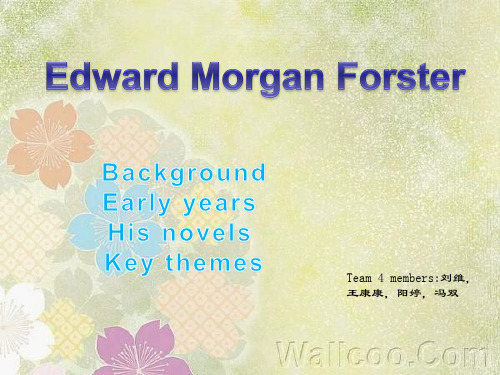
• Forster was born into an Anglo-Irish and Welsh middle-class family at 6 Melcombe Place, Dorset Square, London. He was the only child of Edward Morgan Llewellyn Forster, an architect. At King‘s College, Cambridge, between 1897 and 1901, he became a member of a discussion society known as the Apostles(传道者)。 • After leaving university he travelled in continental Europe with his mother. He visited Egypt, Germany and India in 1914. By that time, Forster had written all but one of his novels. In the First World War, as a conscientious objector, he volunteered for the International Red Cross, travelling to Alexandria, Egypt. • Forster spent a second spell in India in the early 1920s as the private secretary to Tukojirao III. The Hill of Devi is his non-fictional account of this trip. After returning from India, he completed his last novel, A Passage to India (1924), for which he won the James Tait Black Memorial Prize for fiction
My Wood By E.M. Forster (我的小树林 英国 E.M.福斯特著)备课讲稿

My WoodE. M. ForsterEdward Morgan Forster (1879-1970), English essayist, novelist, biographer, and literary critic, wrote several notable works of fiction dealing with the constricting effects of social and national conventions upon human relationships. These novels include A Room with a View(1908), Howards End(1910), and A Passage to India (1924). In addition, his lectures on fiction, collected as Aspects of the Novel (1927), remain graceful elucidations of the genre. In “My Wood” taken from his essay collection Abinger Harvest(1936), Forster writes with wit and wisdom about effect of property upon human behavior---notably his own.A few years ago I wrote a book which dealt with in part with the difficulties of the English in India. Feeling that they would have had no difficulties in India themselves, Americans read the book freely. The more they read it the better it made them feel, and a cheque to the author was the result. I bought a wood with the cheque. It is not a large wood----it contains scarcely any trees, and it is intersected, blast it by a public footpath. Still, it is the first property that I have owned, so it is right that other people should participate in my shame, and should ask themselves, in accents that will vary in horror, this very important question: What is the effect upon the character? Don’t let’s touch the economics; the effect of private ownership upon the community as a whole is another question----a more important question, perhaps, but another one. Let’s keep to psychology.If you own things, what’s their effect on you? What’s the effect on me of my wood?In the first place, it makes me feel heavy. Property does have this effect. Property produces men of weight, and it was a man of weight who failed to get into the Kingdom of Heaven. He was not wicked, that unfortunate millionaire in the parable, he was only stout; he stuck out in front, not to mention behind, and as he wedged himself this way and that in the crystalline entrance and bruised his well-fed flanks, he saw beneath him a comparatively slim camel passing through the eye of a needle and being woven into the robe of God. The Gospels all through couple stoutness and slowness. They point out what is perfectly obvious, yet seldom realized: that if you have a lot of things you cannot move about a lot, that furniture requires dusting, dusters require servants, servants require insurance stamps, and the whole tangle of them makes you think twice before you accept an invitation to dinner or go for a bathe in the Jordan. Sometimes the Gospels proceed further and say with Tolstoy that property is sinful; they approach the difficult ground of asceticism here, where I cannot follow them. But as to the immediate effects of property on people, they just show straightforward logic. It produces men of weight. Men of weight cannot, by definition, move like the lightning from the East unto the West, and the ascent of a fourteen-stone bishop into a pulpit is thus the exact antithesis of the coming of the Son of Man. My wood makes me feel heavy.In the second place, it makes me feel it ought to be larger.The other day I heard a twig snap in it. I was annoyed at first, for I thought that someone was blackberrying, and depreciating the value of the undergrowth. On coming nearer, I saw it was not a man who had trodden on the twig and snapped it, but a bird, and I felt pleased. My bird. The bird was not equally pleased. Ignoring the relation between us, it took fright as soon as it saw the shape of my face, and flew straight over the boundary h edge into field, the property of Mrs. Henessy’s bird. Something seemed grossly amiss here, something that would not have occurred had the wood been larger. I could not afford to buy Mrs. Henessy out, I dared not murder her, and limitations of this sort beset me on every side. Ahab did not want that vineyard---he only needed it to round off his property, preparatory to plotting a new curve---and all the land around my wood has become necessary to me in order to round off the wood. A boundary protects. But ----poor little things---the boundary in its turn to be protected. Noises on the edge of it. Children throw stones. A little more, and then a little more, until we reach the sea. Happy Canute! Happier Alexander! And after all, why should even the world be the limit of possession? A rocket containing a Union Jack, will, it is hoped, be shortly fired at the moon. Mars Sirius. Beyond which…But these immensities ended by saddening me. I could not suppose that my wood was destined nucleus of universal dominion---it is so very small and contains no mineral wealth beyond the blackberries. Nor was I comforted when Mrs. Henessy’s bird took alarm for the second time and flew clean away from us all, under the belief that it belonged to itself.In the third place, property makes its owner feel that he ought to do something to it. Yet he isn’t sure what. A restlessness comes over him, a vague sense that he has a personality to express---the same sense which, without any vagueness, leads the artist to an act of creation. Sometimes I think I will cut down such trees as remain in the wood, at other times I want to fill up the gaps between them with new trees. Both impulses are pretentious and empty. They are not honest movements towards money-making or beauty. They spring from a foolish desire to express myself and from an inability to enjoy what I have got. Creation, property, enjoyment form a sinister trinity in the human mind. Creation and enjoyment are both very, very good, yet they are often unattainable without a material basis, and at such moments property pushes itself in as a substitute, saying, “Accept me instead---I’m good enough for all three.” It is not enough. It is, as Shakespeare said of lust, “The expense or spirit in a waste of shame”: it is “Before, a joy proposed; behind, a dream.” Yet we don’t know how to shun it. It is forced on us by our economic system as the alternative to starvation. It is also forced on us by an internal defect in the soul, by the feeling that in property may lie the germs of self-development and of exquisite or heroic deeds. Our life on earth is, and ought to be, material and carnal! But we have not yet learned to manage our materialism and carnality properly; they are still entangled with the desire for ownership, where (in the words of Dante) “Possession is one with loss.”And this brings us to our fourth and final point: the blackberries.Blackberries are not plentiful in this meager grove, but they are easily seen from the public footpath which traverses it, and all too easily gathered. Foxgroves, too---people pull up the foxgroves, and ladies of an educational tendency even grubfor toadstools to show them on the Monday in class. Other ladies, less educated, roll down the bracken in the arms of their gentlemen friends. There is paper, there are tins. Pray, does my wood belong to me or doesn’t it? And, if it does, should I not own it best by allowing no one else to walk there? There is a wood near Lyme Regis, also cursed by a public footpath, where the owner has not hesitated on this point. He has built high stone walls each side of the path, and has spanned it by bridges, so that the public circulate like termites while he gorges on the blackberries unseen. He really does own his wood, this able chap. Dives in Hell did pretty well, but the gulf dividing him from lazarus could be travesed by vision, and nothing traverses it here. And perhaps I shall come to this in time. I shall wall in and fence out until I really taste the sweets of property. Enormously stout, endlessly avaricious, pseudo-creative, intensely selfish, I shall weave upon my forehead the quadruple crown of possession until those nasty Bolshies come and take it off again and thrust me aside into the outer darkness.。
E.M.Forster

Maurice
Compellingly honest and beautifully written, it offers a powerful Hall is a young of man who grows up condemnation the repressive attitudes confident his privileged status of Britishin society, and is at once and a well aware of love his role in and society. Modest tale and of moving story an intimate Freedom generally conformist, nevertheless one man's erotic and he political self- finds himself increasingly attracted to his own discovery. Equality sex.
Where Angels Fear to Tread(1905)
Howards End(1910)
The Longest Journey(1907)
Novels
A Passage to India(1924)
A Room with a View(1908)
Maurice
(1914 finished
E.M.FORSTER
Brief introduction of Edward Morgan Forster
• •
Works and theme
• •
Character evaluation
•
《最漫长的旅程》中隐匿的同性恋主题
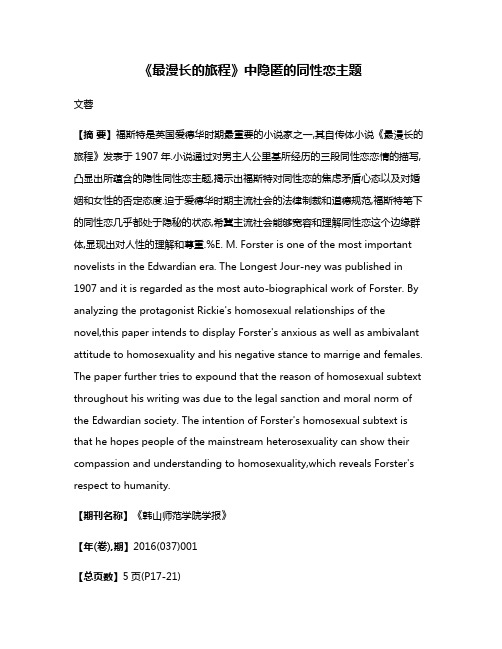
《最漫长的旅程》中隐匿的同性恋主题文蓉【摘要】福斯特是英国爱德华时期最重要的小说家之一,其自传体小说《最漫长的旅程》发表于1907年.小说通过对男主人公里基所经历的三段同性恋恋情的描写,凸显出所蕴含的隐性同性恋主题,揭示出福斯特对同性恋的焦虑矛盾心态以及对婚姻和女性的否定态度.迫于爱德华时期主流社会的法律制裁和道德规范,福斯特笔下的同性恋几乎都处于隐秘的状态,希冀主流社会能够宽容和理解同性恋这个边缘群体,显现出对人性的理解和尊重.%E. M. Forster is one of the most important novelists in the Edwardian era. The Longest Jour-ney was published in 1907 and it is regarded as the most auto-biographical work of Forster. By analyzing the protagonist Rickie's homosexual relationships of the novel,this paper intends to display Forster's anxious as well as ambivalant attitude to homosexuality and his negative stance to marrige and females. The paper further tries to expound that the reason of homosexual subtext throughout his writing was due to the legal sanction and moral norm of the Edwardian society. The intention of Forster's homosexual subtext is that he hopes people of the mainstream heterosexuality can show their compassion and understanding to homosexuality,which reveals Forster's respect to humanity.【期刊名称】《韩山师范学院学报》【年(卷),期】2016(037)001【总页数】5页(P17-21)【关键词】福斯特;《最漫长的旅程》;隐匿的同性恋主题【作者】文蓉【作者单位】嘉应学院外国语学院,广东梅州 514015【正文语种】中文【中图分类】I106.4福斯特(E. M. Forster,1879-1970)是英国爱德华时期最重要的小说家之一,其自传体小说《最漫长的旅程》发表于1907年。
20世纪英国文学作者及作品

er
爱德华· 摩根· 福斯特(Edward Morgan Forster, 通称E. M.Forster,1879~1970)是20 世纪英国著名的作家,其作品包括六部小说, 两集短篇小说集,几部传记和一些评论文章。 他的长篇小说几乎都是反映英国中上层阶级的 精神贫困,在每部作品中主人公都试图通过挣 脱社会与习俗的约束来求得个人解放。福斯特 的作品语风清新淡雅,虽然人物的个性很容易 被把握,但命运安排往往令人不可预测却又铺 叙自然。八十年代以来《印度之行》、《看得 见风景的房间》、《天使不敢驻足的地方》、 《莫利斯Maurice》和《霍华德庄园》都被成功 地搬上银幕,使福斯特的作品得到了更为广泛 的流传。①虽然这些作品反映的都是二十世纪 初英国的社会状况,但其间表达的自由、平等 与人道的精神对正在走入二十一世纪的人类社 会仍有实际的借鉴意义。
A Passage to India
小说以印度城市为背景,写治 安法官的母亲与未婚妻阿拉德 到印度去看他,在一次历游山 洞时,阿拉德在幽暗的山洞里 恍惚中感到有人侮辱了她,从 而引起纠纷,使印度医生阿齐 斯蒙受了不白之冤。这部小说 展示了英国与其殖民地印度两 个民族间不可逾越的鸿沟,充 满辛辣的讽刺、优美的抒情、 含义深远的象征和富有哲理的 预见。是英国20世纪最后一本 成功的传统小说。
To the Lighthouse
wrence
戴维· 赫伯特· 劳伦斯(David Herbert lawrence,18851930),英国文学家,诗人。 为二十世纪英国最独特和最有 争议的作家之一,他笔下有许 多脍炙人口的名篇,其中的 《查泰莱夫人的情人》 (1928),《儿子与情人》, 《虹》(1915),《恋爱中 的女人》(1921),《误入 歧途的女人》等都有中译本。
大学英语专业,英语高级散文课文翻译7

Lesson Seven Plot第七课情节E.M. ForsterE.M.福斯特New wordssequence (n.) A number of things in or as if in line: series, chain, catena, course, ordercausality n. pl. causalities 1. The principle of or relationship between cause and effect. 2. A causal agency, force, or quality.preserve, keepovershadow (v.) To surpass in power, importance, or influence: predominate, dominate, govern, loom large, prevailUnderline the keywords1 Let us define a plot. We have defined a story as a narrative of events arranged in their time-sequence. A plot is also a narrative of events, the emphasis falling on causality. "The king died and then the queen dies," is a story. "The king dies, and then the queen died of grief," is a plot. The time-sequence is preserved, but the sense of causality overshadows it.译文让我们给情节下一个定义,我们已经把故事定义为按时间叙事。
英语专八 英美文学 作品及作者简介
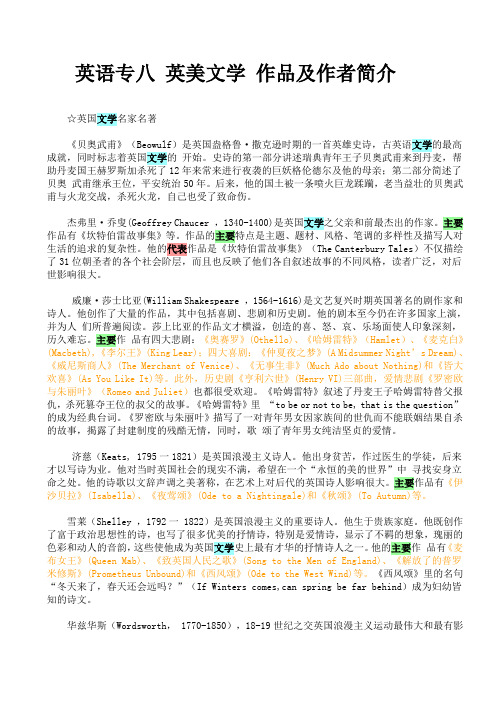
英语专八英美文学作品及作者简介☆英国文学名家名著《贝奥武甫》(Beowulf)是英国盎格鲁·撒克逊时期的一首英雄史诗,古英语文学的最高成就,同时标志着英国文学的开始。
史诗的第一部分讲述瑞典青年王子贝奥武甫来到丹麦,帮助丹麦国王赫罗斯加杀死了12年来常来进行夜袭的巨妖格伦德尔及他的母亲;第二部分简述了贝奥武甫继承王位,平安统治50年。
后来,他的国土被一条喷火巨龙蹂躏,老当益壮的贝奥武甫与火龙交战,杀死火龙,自己也受了致命伤。
杰弗里·乔叟(Geoffrey Chaucer ,1340-1400)是英国文学之父亲和前最杰出的作家。
主要作品有《坎特伯雷故事集》等。
作品的主要特点是主题、题材、风格、笔调的多样性及描写人对生活的追求的复杂性。
他的代表作品是《坎特伯雷故事集》(The Canterbury Tales)不仅描绘了31位朝圣者的各个社会阶层,而且也反映了他们各自叙述故事的不同风格,读者广泛,对后世影响很大。
威廉·莎士比亚(William Shakespeare ,1564-1616)是文艺复兴时期英国著名的剧作家和诗人。
他创作了大量的作品,其中包括喜剧、悲剧和历史剧。
他的剧本至今仍在许多国家上演,并为人们所普遍阅读。
莎上比亚的作品文才横溢,创造的喜、怒、哀、乐场面使人印象深刻,历久难忘。
主要作品有四大悲剧:《奥赛罗》(Othello)、《哈姆雷特》(Hamlet)、《麦克白》(Macbeth),《李尔王》(King Lear);四大喜剧:《仲夏夜之梦》(A Midsummer Night’s Dream)、《威尼斯商人》(The Merchant of Venice)、《无事生非》(Much Ado about Nothing)和《皆大欢喜》(As You Like It)等。
此外,历史剧《亨利六世》(Henry VI)三部曲,爱情悲剧《罗密欧与朱丽叶》(Romeo and Juliet)也都很受欢迎。
My-Wood--By-E.M.-Forster-(我的小树林--英国-E.M.福斯特著)备课讲稿

My WoodE. M. ForsterEdward Morgan Forster (1879-1970), English essayist, novelist, biographer, and literary critic, wrote several notable works of fiction dealing with the constricting effects of social and national conventions upon human relationships. These novels include A Room with a View(1908), Howards End(1910), and A Passage to India (1924). In addition, his lectures on fiction, collected as Aspects of the Novel (1927), remain graceful elucidations of the genre. In “My Wood” taken from his essay collection Abinger Harvest(1936), Forster writes with wit and wisdom about effect of property upon human behavior---notably his own.A few years ago I wrote a book which dealt with in part with the difficulties of the English in India. Feeling that they would have had no difficulties in India themselves, Americans read the book freely. The more they read it the better it made them feel, and a cheque to the author was the result. I bought a wood with the cheque. It is not a large wood----it contains scarcely any trees, and it is intersected, blast it by a public footpath. Still, it is the first property that I have owned, so it is right that other people should participate in my shame, and should ask themselves, in accents that will vary in horror, this very important question: What is the effect upon the character? Don’t let’s touch the economics; the effect of private ownership upon the community as a whole is another question----a more important question, perhaps, but another one. Let’s keep to psychology. If you own things, what’s their effect on you? What’s the effect on me of my wood?In the first place, it makes me feel heavy. Property does have this effect. Property produces men of weight, and it was a man of weight who failed to get into the Kingdom of Heaven. He was not wicked, that unfortunate millionaire in the parable, he was only stout; he stuck out in front, not to mention behind, and as he wedged himself this way and that in the crystalline entrance and bruised his well-fed flanks, he saw beneath him a comparatively slim camel passing through the eye of a needle and being woven into the robe of God. The Gospels all through couple stoutness and slowness. They point out what is perfectly obvious, yet seldom realized: that if you have a lot of things you cannot move about a lot, that furniture requires dusting, dusters require servants, servants require insurance stamps, and the whole tangle of them makes you think twice before you accept an invitation to dinner or go for a bathe in the Jordan. Sometimes the Gospels proceed further and say with Tolstoy that property is sinful; they approach the difficult ground of asceticism here, where I cannot follow them. But as to the immediate effects of property on people, they just show straightforward logic. It produces men of weight. Men of weight cannot, by definition, move like the lightning from the East unto the West, and the ascent of a fourteen-stone bishop into a pulpit is thus the exact antithesis of the coming of the Son of Man. My wood makes me feel heavy.In the second place, it makes me feel it ought to be larger.The other day I heard a twig snap in it. I was annoyed at first, for I thought that someone was blackberrying, and depreciating the value of the undergrowth. On coming nearer, I saw it was not a man who had trodden on the twig and snapped it, but a bird, and I felt pleased. My bird. The bird was not equally pleased. Ignoring the relation between us, it took fright as soon as it saw the shape of my face, and flew straight over the boundary hedge into field, th e property of Mrs. Henessy’s bird. Something seemed grossly amiss here, something that would not have occurred had the wood been larger. I could not afford to buy Mrs. Henessy out, I dared not murder her, and limitations of this sort beset me on every side. Ahab did not want that vineyard---he only needed it to round off his property, preparatory to plotting a new curve---and all the land around my wood has become necessary to me in order to round off the wood. A boundary protects. But ----poor little things---the boundary in its turn to be protected. Noises on the edge of it. Children throw stones. A little more, and then a little more, until we reach the sea. Happy Canute! Happier Alexander! And after all, why should even the world be the limit of possession? A rocket containing a Union Jack, will, it is hoped, be shortly fired at the moon. Mars Sirius. Beyond which…But these immensities ended by saddening me. I could not suppose that my wood was destined nucleus of universal dominion---it is so very small and contains no mineral wealth beyond the blackberries. Nor was I comforted when Mrs. Henessy’s bird took alarm for the second time and flew clean away from us all, under the belief that it belonged to itself.In the third place, property makes its owner feel that he ought to do something to it. Yet he isn’t sure what. A restlessness comes over him, a vague sense that he has a personality to express---the same sense which, without any vagueness, leads the artist to an act of creation. Sometimes I think I will cut down such trees as remain in the wood, at other times I want to fill up the gaps between them with new trees. Both impulses are pretentious and empty. They are not honest movements towards money-making or beauty. They spring from a foolish desire to express myself and from an inability to enjoy what I have got. Creation, property, enjoyment form a sinister trinity in the human mind. Creation and enjoyment are both very, very good, yet they are often unattainable without a material basis, and at such moments property pushes itself in as a substitute, saying, “Accept me instead---I’m good enough for all three.” It is not enough. It is, as Shakespeare said of lust, “The expense or spirit in a waste of shame”: it is “Before, a joy proposed; behind, a dream.” Yet we don’t know how to shun it. It is forced on us by our economic system as the alternative to starvation. It is also forced on us by an internal defect in the soul, by the feeling that in property may lie the germs of self-development and of exquisite or heroic deeds. Our life on earth is, and ought to be, material and carnal! But we have not yet learned to manage our materialism and carnality properly; they are still entangled with the desire for ownership, where (in the words of Dante) “Possession is one with loss.”And this brings us to our fourth and final point: the blackberries.Blackberries are not plentiful in this meager grove, but they are easily seen from the public footpath which traverses it, and all too easily gathered. Foxgroves, too---people pull up the foxgroves, and ladies of an educational tendency even grubfor toadstools to show them on the Monday in class. Other ladies, less educated, roll down the bracken in the arms of their gentlemen friends. There is paper, there are tins. Pray, does my wood belong to me or doesn’t it? And, if it does, should I not own it best by allowing no one else to walk there? There is a wood near Lyme Regis, also cursed by a public footpath, where the owner has not hesitated on this point. He has built high stone walls each side of the path, and has spanned it by bridges, so that the public circulate like termites while he gorges on the blackberries unseen. He really does own his wood, this able chap. Dives in Hell did pretty well, but the gulf dividing him from lazarus could be travesed by vision, and nothing traverses it here. And perhaps I shall come to this in time. I shall wall in and fence out until I really taste the sweets of property. Enormously stout, endlessly avaricious, pseudo-creative, intensely selfish, I shall weave upon my forehead the quadruple crown of possession until those nasty Bolshies come and take it off again and thrust me aside into the outer darkness.。
my wood e.m.forster 中的典故

my wood e.m.forster 中的典故
“My wood”是英国著名小说家、散文家爱德华·摩根·福斯特(Edward Morgan Forster)于二十世纪三十年代所创作的散文,被收录在福斯特的杂文集《阿宾哲收获集》中。
在该散文中,福斯特运用了典故、引用、夸张等修辞手法,分析了财产的拥有给人带来的四个恶劣后果。
其中提到的典故是《马太福音》中的一个故事:一位不幸的富翁在天堂之门被拒之门外,因为他太胖了,无法进入。
这个典故强调了财产对人的性格和行为的影响,即拥有过多的财产可能会导致人们变得懒惰、自私和贪婪。
研究e.m.forster的书籍
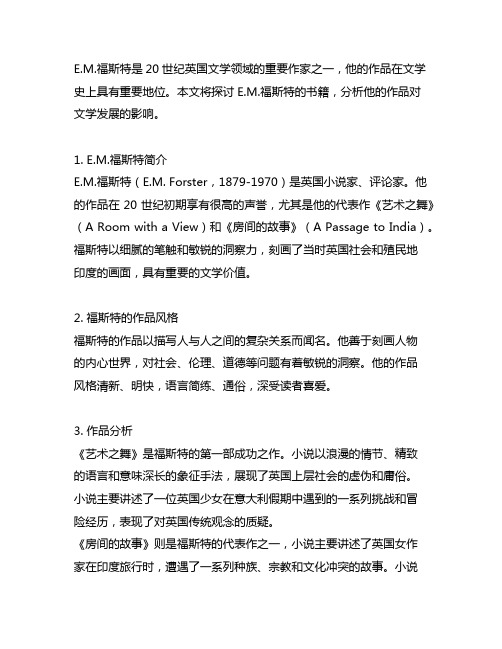
E.M.福斯特是20世纪英国文学领域的重要作家之一,他的作品在文学史上具有重要地位。
本文将探讨E.M.福斯特的书籍,分析他的作品对文学发展的影响。
1. E.M.福斯特简介E.M.福斯特(E.M. Forster,1879-1970)是英国小说家、评论家。
他的作品在20世纪初期享有很高的声誉,尤其是他的代表作《艺术之舞》(A Room with a View)和《房间的故事》(A Passage to India)。
福斯特以细腻的笔触和敏锐的洞察力,刻画了当时英国社会和殖民地印度的画面,具有重要的文学价值。
2. 福斯特的作品风格福斯特的作品以描写人与人之间的复杂关系而闻名。
他善于刻画人物的内心世界,对社会、伦理、道德等问题有着敏锐的洞察。
他的作品风格清新、明快,语言简练、通俗,深受读者喜爱。
3. 作品分析《艺术之舞》是福斯特的第一部成功之作。
小说以浪漫的情节、精致的语言和意味深长的象征手法,展现了英国上层社会的虚伪和庸俗。
小说主要讲述了一位英国少女在意大利假期中遇到的一系列挑战和冒险经历,表现了对英国传统观念的质疑。
《房间的故事》则是福斯特的代表作之一,小说主要讲述了英国女作家在印度旅行时,遭遇了一系列种族、宗教和文化冲突的故事。
小说以生动的语言描绘了殖民地印度的风土人情,展现了对殖民主义的批判和谴责。
这部小说被认为是福斯特对英国帝国主义的控诉之作,具有极高的文学价值。
福斯特还有许多其他优秀的作品,如《小岛》、《Howard's End》等,他的作品广泛涉及社会现实、个人情感、人性等方面,具有深刻的思想内涵和丰富的艺术表现力。
4. 福斯特的影响福斯特以其深刻的洞察力和对社会现实的关注,对20世纪英国文学产生了深远的影响。
他的作品在当时引起了广泛的关注和争议,在文学界产生了重要影响。
他对小说结构的创新和独特的叙事手法,对当时的英国文学产生了积极的影响,为英国文学的发展开辟了新的道路。
福斯特的作品也对国际文学产生了重要影响。
如何鉴赏佛罗伦萨的回忆
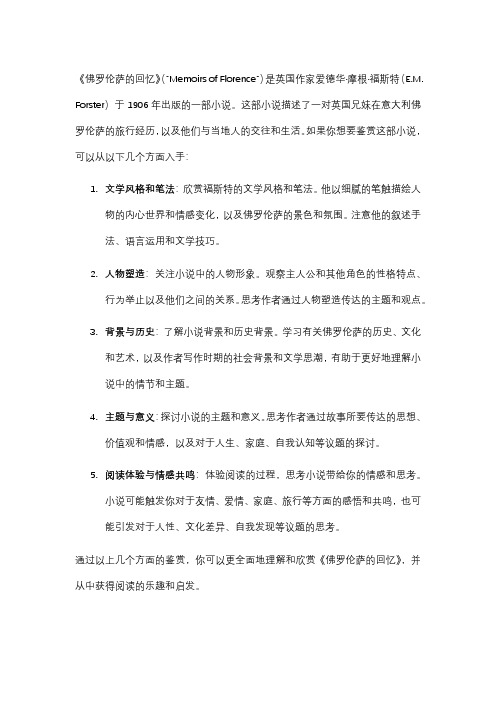
《佛罗伦萨的回忆》("Memoirs of Florence")是英国作家爱德华·摩根·福斯特(E.M. Forster)于1906年出版的一部小说。
这部小说描述了一对英国兄妹在意大利佛罗伦萨的旅行经历,以及他们与当地人的交往和生活。
如果你想要鉴赏这部小说,可以从以下几个方面入手:
1.文学风格和笔法:欣赏福斯特的文学风格和笔法。
他以细腻的笔触描绘人
物的内心世界和情感变化,以及佛罗伦萨的景色和氛围。
注意他的叙述手
法、语言运用和文学技巧。
2.人物塑造:关注小说中的人物形象。
观察主人公和其他角色的性格特点、
行为举止以及他们之间的关系。
思考作者通过人物塑造传达的主题和观点。
3.背景与历史:了解小说背景和历史背景。
学习有关佛罗伦萨的历史、文化
和艺术,以及作者写作时期的社会背景和文学思潮,有助于更好地理解小
说中的情节和主题。
4.主题与意义:探讨小说的主题和意义。
思考作者通过故事所要传达的思想、
价值观和情感,以及对于人生、家庭、自我认知等议题的探讨。
5.阅读体验与情感共鸣:体验阅读的过程,思考小说带给你的情感和思考。
小说可能触发你对于友情、爱情、家庭、旅行等方面的感悟和共鸣,也可
能引发对于人性、文化差异、自我发现等议题的思考。
通过以上几个方面的鉴赏,你可以更全面地理解和欣赏《佛罗伦萨的回忆》,并从中获得阅读的乐趣和启发。
《霍华德庄园》中人物焦虑霍妮式解读

A Horneyan Interpretation of Characters’Anxiety in Howards EndA Thesis Submitted to Chongqing Universityin Partial Fulfillment of the Requirement for theMaster‟s Degree of ArtsByZhang JieSupervised by Asso. Prof. Li JingSpecialty:English Language and LiteratureSchool of Languages and Cultures ofChongqing University, Chongqing, ChinaApril, 2014摘要E. M. 福斯特(Edward Morgan Forster,1879-1970) 是英国文学史上著名的作家,他同乔伊斯、劳伦斯和伍尔夫一起被称为20世纪英国最伟大的小说家。
《霍华德庄园》作为他的代表作之一,自1910年发表以来赢得了广泛的关注。
作为一部典型的英国社会小说,《霍华德庄园》揭示了爱德华时代社会的深刻变动给人们生活上所带来的广泛影响,特别是对中产阶级产生的精神上的冲击。
本文运用新精神分析学家霍妮的焦虑理论来探讨《霍华德庄园》中主要人物的焦虑,以人物的焦虑心理为切入点,通过运用霍妮的焦虑理论和文本细读的方法,来分析福斯特对爱德华时代人物内心状况的关注和探索。
通过对小说中四个人物内心焦虑的表现、焦虑产生的原因、应对焦虑的防御策略以及由此导致的后果,揭示出爱德华时代的文化环境是个体焦虑产生的重要原因,并指出只有通过灵活运用霍妮提出的三种防御策略才能有效地对抗焦虑。
该研究是对《霍华德庄园》的一种全新解读,试图为研究福斯特的作品提供一种新的视角。
《霍华兹庄园》描述了爱德华时代的英国中产阶级三类人物的焦虑状态,而这种焦虑正是爱德华时代的社会文化环境和个人成长经历共同作用的结果。
My-Wood--E.M.-Forster-文章分析

"And this brings us to our fourth and final point: the blackberries."
• In the last paragraph, now Forster, as a newly property owner, conveys his attitude towards ownership. He imagines that he will become a shameless and selfish property owner just as the owner whose wood near Lyme Regis and Dives in Hell.
• Then, we will talk about how Forster give us his answer step by step in this essay.
"In the first place, it makes me feel heavy."
• Forster believes that property produces man of weight and it was a man of weight who failed to get into the Kingdom of Heaven.
"In the second place, it makes me feel it ought to be larger."
• In this paragraph, Forster writes “The other day I heard a twig snap in it. I was annoyed at first, for I thought that someone was blackerrying, and depreciating the value of the undergrowth.” • Forster wants to express that someone is blackerrying in his wood and the plants in his wood may be trodden. He uses the mock seriousness, especially the expression of “depreciating the undergrowth”, which overstates the author’s gingerliness that comes from his possession.
4 霍华德庄园
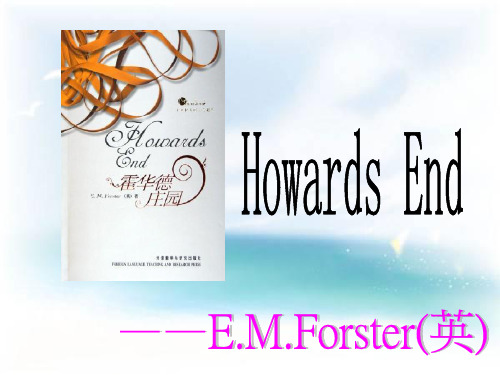
Modern Civilization
• • • • • •
real estate motor-cars telegrams golf-clubs money ……
Theme
As Helen the "The whole Wilcoxes Obviously,said,author supports the land family was a fraud, just a wall of civilization and criticizes the newspapers and motor-cars and industrialization and urbanization. golf-clubs, and that if it fell I should find nothing behind it but panic and emptiness."
• It's a story about the inheritance of family property and the marriage of heroine(Margaret Schlegel) at the beginning of the twentieth century. • It's also a fable(寓言) about England and the destiny of human civilization.
E.M.Forster(1879-1970) English novelist, short story writer, essayist and librettist(歌剧的歌词作 者). He is known best for his ironic and wellplotted novels examing class difference and hypocrisy in early 20thcentury British society.
欧亨利式结尾的例子
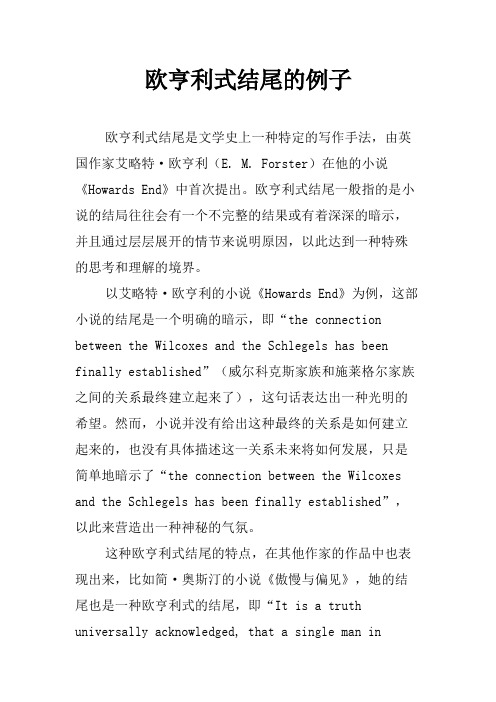
欧亨利式结尾的例子欧亨利式结尾是文学史上一种特定的写作手法,由英国作家艾略特·欧亨利(E. M. Forster)在他的小说《Howards End》中首次提出。
欧亨利式结尾一般指的是小说的结局往往会有一个不完整的结果或有着深深的暗示,并且通过层层展开的情节来说明原因,以此达到一种特殊的思考和理解的境界。
以艾略特·欧亨利的小说《Howards End》为例,这部小说的结尾是一个明确的暗示,即“the connection between the Wilcoxes and the Schlegels has been finally established”(威尔科克斯家族和施莱格尔家族之间的关系最终建立起来了),这句话表达出一种光明的希望。
然而,小说并没有给出这种最终的关系是如何建立起来的,也没有具体描述这一关系未来将如何发展,只是简单地暗示了“the connection between the Wilcoxes and the Schlegels has been finally established”,以此来营造出一种神秘的气氛。
这种欧亨利式结尾的特点,在其他作家的作品中也表现出来,比如简·奥斯汀的小说《傲慢与偏见》,她的结尾也是一种欧亨利式的结尾,即“It is a truth universally acknowledged, that a single man inpossession of a good fortune must be in want of a wife”(人人皆知,一个有着良好的财富的单身男子必然会想要找一个妻子)。
这句话本身没有提供任何具体的信息,而是通过暗示来表达出社会上关于婚姻观念的普遍性。
比较现代的例子,就可以看到斯蒂芬•金的小说《绿野仙踪》,这部小说的结尾也是一种欧亨利式的结尾,即“And so they all lived happily ever after”(他们都过上了幸福的生活)。
- 1、下载文档前请自行甄别文档内容的完整性,平台不提供额外的编辑、内容补充、找答案等附加服务。
- 2、"仅部分预览"的文档,不可在线预览部分如存在完整性等问题,可反馈申请退款(可完整预览的文档不适用该条件!)。
- 3、如文档侵犯您的权益,请联系客服反馈,我们会尽快为您处理(人工客服工作时间:9:00-18:30)。
Howards End (1910)
• is tells a story of class struggle in turn-ofthe-century England. The main theme is the difficulties, troubles, and also the benefits of relationships between members of different social classes. • Many critics, including Lionel Trilling, consider Howards End "undoubtedly Forster's masterpiece
Howards End 霍华德庄园
• Howards End (1910) is an ambitious "condition-of-England" novel concerned with different groups within the Edwardian middle classes represented by three families : the Schlegels (bohemian intellectuals), the Wilcox's (thoughtless plutocrats) and the Basts (struggling lower-middle-class aspirants).
The longest Journey(1907),
• an early novel, he suggested that cultivation of either in isolation is not enough, reliance on the earth alone leading to a genial brutishness and exaggerated development of imagination undermining the individual‟s sense of reality.
Early theme and style(2)
• There was also a deeper concern, a belief, associated with Forster‟s Mediterranean “paganism”. That, if men and women were to achieve a satisfactory life, they need to keep contact with the earth and to cultivate their imaginations.
early theme and style
• On leaving Cambridge, Forster decided to devote his life to writing. His first novels and short stories were redolent of an age that was shaking off the shackles of Victorianism. • He wrote in a freer and more colloquial style. He included a strong strain of social comment, based on acute observation of middle-class life.
Where angels fear to trend
• Despite her flaws, though, one cannot help but admire her for her courage in rebelling against and challenging the status quo - the status quo which appears to imprison so many in Edwardian English society.
• At King‟s college, Cambridge, he enjoyed a sense of liberation. • here He gained a sense of • the uniqueness of the individual, • the healthiness of modern skepticism, • the importance of Mediterranean civilization as a counterbalance to the more straitlaced attitudes of northern European countries,
Bloomsbury Group
• or Bloomsbury Set was a group of writers, intellectuals, philosophers and artists who held informal discussions in Bloomsbury throughout the 20th century. This English collective of friends and relatives lived, worked or studied near Bloomsbury in London during the first half of the twentieth century. Their work deeply influenced Literature, aesthetics, criticism, and economics as well as modern attitudes towards feminism, pacifism and sexuality, Its best known members were Virginia Woolfe, John Mayard Keynes, E.M.Forster and Lytton Strachey.
Maurice
• An interval of fourteen years elapsed before he published A Passage to India. Maurice, his novel on a homosexual theme, finished in 1914, was published posthumously in 1971.
Where angels fear to trend
• When attractive, impulsive English widow Lidia marrying Gino, a dashing and highly unsuitable Italian twelve years her junior. • Her prim, snobbish in-laws „s disapproval, the unfortunate family rescue operation sent to save a baby from being brought up in wrong faith . But confronted by the beauty of Italy and the charm and vitality of the disreputable Gino, they are forced to examine their own narrow lives, and their reactions are emotional, violent and unexpected.
Life Career
• Forster‟s father, an architect, died when the son was a baby, • and he was brought up by mother and paternal aunts. • The difference between the two families, • while his education as a dayboy at Tonbridge School, Kent, leading later to his criticism of public education system
Literary works
• Forster had 5 novels published in lifetime. • First novel, 1905, Where Angels fear to Tread. • The Longest Journey, 1907. a Bildungsroman(教育小说) • A Room With a View, 1908, This novel is his lightest and most optimistic work
Life Career
• Father died young of TB. • Aged 8, He inherited £8,000 at the death of his paternal great aunt in 1887. • between 1897 and 1901, king‟s college, Cambridge.
• The Eternal Moment(1928) • Abinger Harvest(1936 • Two Cheers for Democracy(1951)
Where Angels fear to trend
• His title is taken from Pope's 'An Essay on criticism' (1711), where the full line is `For fools rush in where angels fear to tread'. Indeed, most of the characters in this perceptive novel appear foolish in the extreme
